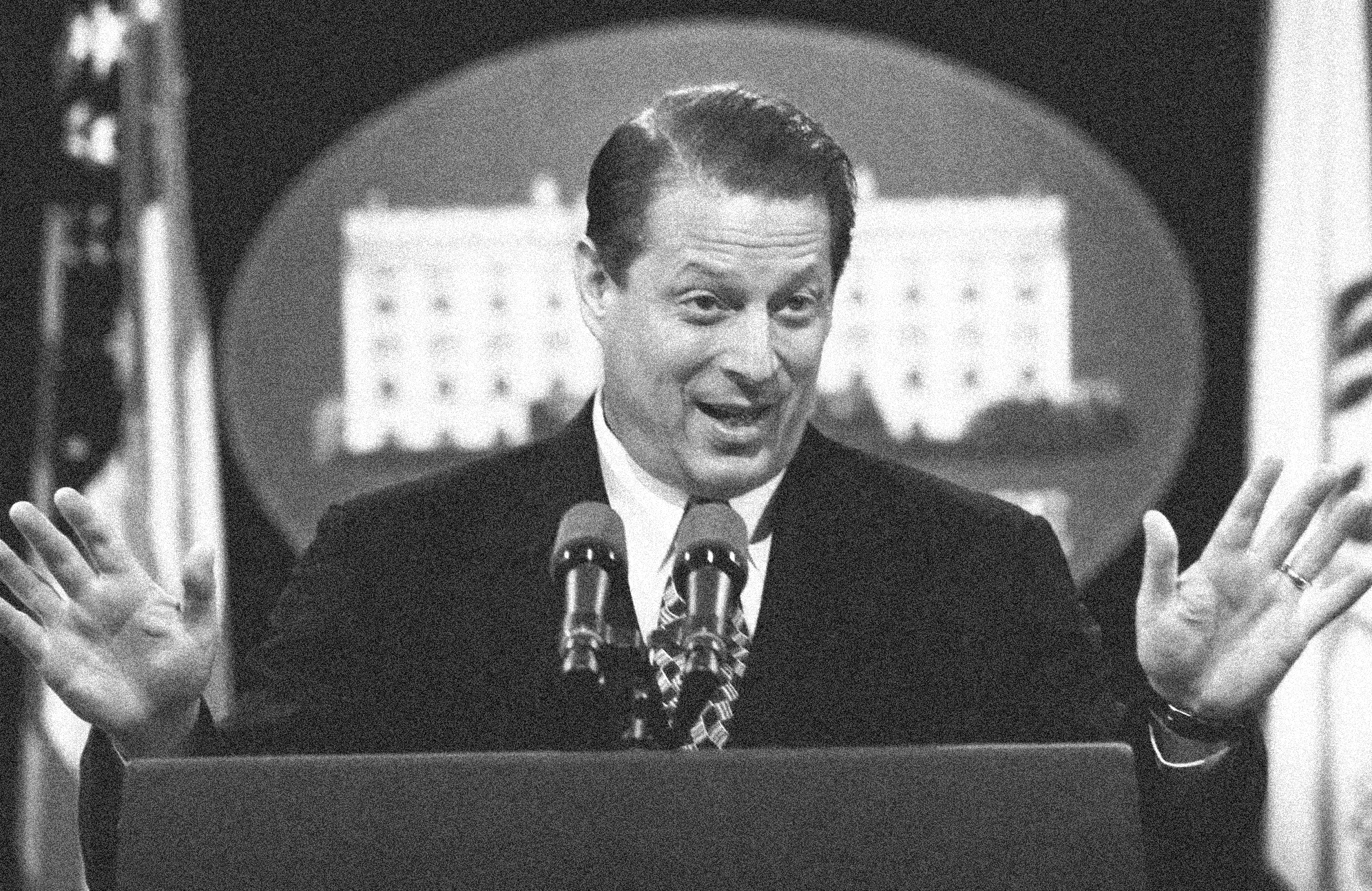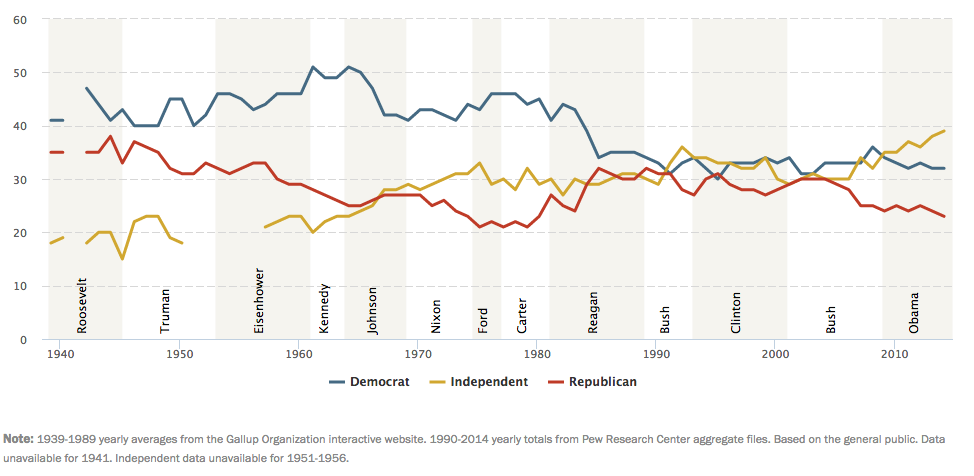Never underestimate the Democrats' ability to blow a presidential race
If you think Hillary Clinton is the biggest risk in 2016, you may not be familiar with her party


Democrats should be nervous about Donald Trump. Well, more specifically, they should be worried about Democrats.
Yes, demographics favor the Democrats in modern presidential elections, and yes, Trump is a spectacularly flawed candidate. But you'd almost never lose money betting on the Democrats blowing a good thing.
Hillary Clinton has her own weaknesses as a candidate, as others have noted, frequently, but this article isn't about Clinton. This is about Democrats, the American political party that most resembles a Hollywood dark comedy about going home for the holidays.
The Week
Escape your echo chamber. Get the facts behind the news, plus analysis from multiple perspectives.

Sign up for The Week's Free Newsletters
From our morning news briefing to a weekly Good News Newsletter, get the best of The Week delivered directly to your inbox.
From our morning news briefing to a weekly Good News Newsletter, get the best of The Week delivered directly to your inbox.
If you start the clock in 2006, the idea of Democrats as hapless self-saboteurs might sound odd. That was the year the party captured the House, the Senate, and a majority of governorships, elevating Nancy Pelosi to the House speakership, thus making her the highest-ranking woman in U.S. government history. Two years later, Democrats elected a black first-term senator to the presidency in a landslide. They re-elected him four years later.
But if you take the Barack Obama juggernaut and the George W. Bush second-term train wreck out of the equation, things look less rosy for the donkeys.
As Samantha Bee — the latest liberal satirist to get her own show — has been hammering home, Democrats blew almost all their gains in the off-year Obama elections, 2010 and 2014. In 2010 especially, Republicans crushed the Democrats nationally, sweeping away Democratic legislatures and statehouses and flipping the House. The lightly used Democratic supermajority in the Senate was whittled down to a bare majority, then erased entirely in 2014. For a year, the Democrats could have enacted Bernie's wish list — what they got was Dodd-Frank and ObamaCare.
To be fair, those are big achievements, on their own merits. It's when you look back a little bit further that Democrats truly enter the morass of disarray.
A free daily email with the biggest news stories of the day – and the best features from TheWeek.com
There's a lot of talk about why older Democrats are voting for Clinton and younger ones are backing Bernie Sanders. One possible explanation is that Bill Clinton is the only Democrat who won the presidency between Jimmy Carter and Barack Obama, and Democrats remember that. Sen. John Kerry's near-miss in 2004 can be attributed to the difficulty in unseating a sitting president, and Walter Mondale? It turns out Ronald Reagan was pretty popular in 1984. But the 1988 election should've been more competitive for the Democrats, and the 2000 debacle is the poster child for post-1972 Democratic dysfunction. (The 1968 election might be the high water mark for Democratic disarray.)
Fun fact: If you are a 20-year-old Bernie Sanders supporter, you were 4 years old during Bush vs. Gore, the election that almost broke America and left deep scars on the Democratic Party.
Al Gore's candidacy had a lot of problems — refusing to let Bill Clinton campaign with him, for one — but there's a persuasive argument to be made that his defeat was the left's fault. Based on the political and economic fundamentals, he should have won. And if you look at the popular vote, and the pretty clear intention of Florida's voters, he did win — he beat Bush by half a million votes nationwide.
But first he had to fend off a primary challenge from the left by Sen. Bill Bradley (D-N.J.). Then, infamously, there was Ralph Nader.
It's still a matter of dispute whether Nader's 2.9 million Green Party votes cost Gore the general election — would those voters have just stayed home? — but Bush won Florida by a certified 537 votes, out of nearly 6 million cast. If a few hundred Democrats had held their nose and voted for Gore, or if elderly Democrats in Palm Beach County had not accidentally voted for Pat Buchanan, there would never have been a George W. Bush presidency, an Iraq War, two terms of top-level climate-change denial, and a host of other things Democrats (and Greens) spent the next eight years hating.
Nationally, according to Gallup, there have been more Democrats and Democratic-leaning independents in the U.S. every year since 1991, when the pollsters started consistently measuring party leanings. According to Pew, Democrats have outnumbered Republicans since FDR was president, with the sole exception of 1995, when Republicans had a 1-point advantage.

It's hard to escape the conclusion that if Democrats voted, they would win a lot more. The fact that they don't should probably worry Hillary Clinton. To a large extent it is up to her not to blow this election — the Clintons are often, infamously their own worst enemies — but elections are won by who shows up to vote.
Democrats don't hold a lock on electoral heartache — Bill Clinton got kind of lucky in 1992, and John Kennedy's 1960 victory should probably have an Illinois-sized asterisks. But to be a Democrat from 1968 until 2008 meant, more often than not, losing.
In 2012, Democrats got a big laugh out of Karl Rove pleading with Fox News to take back its call that Obama won re-election — those Ohio numbers just couldn't be right! — and it was particularly delicious because the man standing athwart math, yelling stop, was Rove, George W. Bush's chief strategist and electoral "brain." But if you were a Democrat who'd watched election returns more than a few times, you might have felt a twinge of sympathy amid the mirth. Because you probably recognized Rove's surge of conflicted disbelief, even if instead of melting down on TV, you'd been yelling at the TV from the discomfort of your own couch.
Peter has worked as a news and culture writer and editor at The Week since the site's launch in 2008. He covers politics, world affairs, religion and cultural currents. His journalism career began as a copy editor at a financial newswire and has included editorial positions at The New York Times Magazine, Facts on File, and Oregon State University.
-
 Judge slams ICE violations amid growing backlash
Judge slams ICE violations amid growing backlashSpeed Read ‘ICE is not a law unto itself,’ said a federal judge after the agency violated at least 96 court orders
-
 Political cartoons for January 29
Political cartoons for January 29Cartoons Thursday's political cartoons include 2nd amendment dibs, disturbing news, and AI-inflated bills
-
 The Flower Bearers: ‘a visceral depiction of violence, loss and emotional destruction’
The Flower Bearers: ‘a visceral depiction of violence, loss and emotional destruction’The Week Recommends Rachel Eliza Griffiths’ ‘open wound of a memoir’ is also a powerful ‘love story’ and a ‘portrait of sisterhood’
-
 The billionaires’ wealth tax: a catastrophe for California?
The billionaires’ wealth tax: a catastrophe for California?Talking Point Peter Thiel and Larry Page preparing to change state residency
-
 Bari Weiss’ ‘60 Minutes’ scandal is about more than one report
Bari Weiss’ ‘60 Minutes’ scandal is about more than one reportIN THE SPOTLIGHT By blocking an approved segment on a controversial prison holding US deportees in El Salvador, the editor-in-chief of CBS News has become the main story
-
 Has Zohran Mamdani shown the Democrats how to win again?
Has Zohran Mamdani shown the Democrats how to win again?Today’s Big Question New York City mayoral election touted as victory for left-wing populists but moderate centrist wins elsewhere present more complex path for Democratic Party
-
 Millions turn out for anti-Trump ‘No Kings’ rallies
Millions turn out for anti-Trump ‘No Kings’ ralliesSpeed Read An estimated 7 million people participated, 2 million more than at the first ‘No Kings’ protest in June
-
 Ghislaine Maxwell: angling for a Trump pardon
Ghislaine Maxwell: angling for a Trump pardonTalking Point Convicted sex trafficker's testimony could shed new light on president's links to Jeffrey Epstein
-
 The last words and final moments of 40 presidents
The last words and final moments of 40 presidentsThe Explainer Some are eloquent quotes worthy of the holders of the highest office in the nation, and others... aren't
-
 The JFK files: the truth at last?
The JFK files: the truth at last?In The Spotlight More than 64,000 previously classified documents relating the 1963 assassination of John F. Kennedy have been released by the Trump administration
-
 'Seriously, not literally': how should the world take Donald Trump?
'Seriously, not literally': how should the world take Donald Trump?Today's big question White House rhetoric and reality look likely to become increasingly blurred
